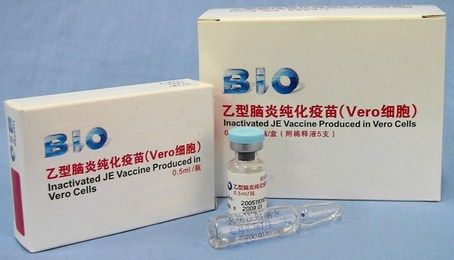Japanese encephalitis vaccine (JE)
What is Japanese encephalitis?
Japanese encephalitis – virus, perenosymыy mosquitoes, which leads to cerebral edema. It can affect the central nervous system and cause severe complications, such as long-term neurological disability and death.
The infection Japanese encephalitis occurs after mosquito bites, infected. Japanese encephalitis is the leading cause of viral encephalitis in Asia.
Japanese encephalitis symptoms include:
- Fever;
- Chills;
- Fatigue;
- Headache;
- Stiff neck;
- Nausea;
- Vomiting;
- Confusion;
- Excitation;
- Brain damage;
- Coma;
- Tremor;
- Convulsions (especially in children);
- Paralysis.
Symptoms of Japanese encephalitis usually appear 5-15 days after the bite of an infected mosquito.
There is no treatment for this disease. Treatment includes therapy, can reduce the symptoms of the disease.
What is a vaccine against Japanese encephalitis?
There are several types of vaccines:
- Ixiaro – for people aged 17 and older. The vaccine is made from an inactive form of the virus;
- PROPERTIES – of the live attenuated vaccine virus.

Who and when to be vaccinated against Japanese encephalitis?
The vaccine is recommended for people, which are sent to Asia, and:
- Plans to stay, at least a month in areas, where there were outbreaks of Japanese encephalitis;
- Plan to stay at least a month, but there will be plenty of time to stay in rural areas or outdoors;
- Sent in the field of Japanese encephalitis outbreak;
- Do not know exactly, where they will be staying.
Laboratory workers should also be vaccinated.
There is no vaccine against Japanese encephalitis for young children. Children under the age of 17 years, who will travel in high-risk areas can visit the hospital after traveling abroad for analysis.
Vaccine Ixiaro provided with a series of injections over two 28 days. The last dose should be administered within one week before the trip to Asia.
Risks, associated with a vaccine against Japanese encephalitis
As with any vaccine, a vaccine against Japanese encephalitis can cause problems, such as heavy allergic reactions. The risk of serious harm or death is extremely small.
The most common problems, associated with the Japanese encephalitis vaccine are mild and include:
- Soreness, redness or swelling near the injection site;
- Fever;
- Headache;
- Muscle aches;
- Abdominal pain;
- Diarrhea;
- Rash;
- Chills;
- Nausea and vomiting;
- Dizziness;
Rare problems include:
- Seizure;
- Nervous system problems;
- Severe allergic reactions, including:
- Rash;
- Swelling of the hands and feet, person, lips;
- Labored breathing.
Who should not be vaccinated against Japanese encephalitis?
Talk to your doctor, before introducing the vaccine, if you:
- There have ever life-threatening reactions to the vaccine;
- We had a severe allergic reaction;
- Are pregnant or breastfeeding;
- Planning a trip to an urban area less than 30 days.
What are the ways to prevent Japanese encephalitis vaccination in addition?
Because the vaccine does not provide 100% efficacy in preventing disease, it is important to protect yourself against mosquito bites. For these purposes, it is recommended:
- Located in a well indoors;
- Wear clothes, which covers most of the body;
- Use effective insect repellents (eg, they, which contain up 30% N,N-Dyэtyl meta-toluamyd, or “DEET”), applied to the skin and clothing to prevent mosquito bites.
What happens in the event of an outbreak of Japanese encephalitis?
In the event of an outbreak of Japanese encephalitis, people, which may be grafted should receive the vaccine.
